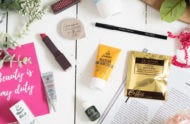If there’s one thing I (Jem, Blog Editor, hi!) pride myself on, it’s my hair. For many, myself included, it’s our armour; the first impression and our pride and joy. Let’s face it, many of us go to great lengths to find the best hairdresser, but we’re often guilty of putting our hair through its paces by over-using damaging haircare products. Speaking of which, have you ever read the ingredient list on your favourite products? If you haven’t, you’d be surprised at how many listed ingredients are doing more harm than good for your luscious locks. Shampoos and conditioners often contain a number of toxic ingredients, many not on your radar when stocking up on your essentials. If you’re health-conscious, or someone who simply wants to get the best possible results out of their beauty products, rest assured you still have many options and it’s fairly stress-free to avoid the ingredients that are likely responsible for common hair woes. A quick check of a product’s ingredient list can tell you a lot about both its benefits and safety, but to steer you in the right direction, here are some of the most common ingredients you may want to avoid…
Sulfates
You don’t have to be an avid beauty buff for sulfates to be on your radar; it’s likely you’re aware of this common nasty and have spotted a number of brands shouting from the rooftops that they are, in fact, sulfate-free. But, why should you avoid them? In short, sulfates are chemical detergents (often found in cleaning products), meaning they are very effective at removing dirt and oil build-up. That may not initially sound like a terrible hair sin, but they’re incredibly harsh on both the hair and scalp, stripping away the natural oils that contribute to healthy, shiny tresses. The most common culprit that you’ll see on many shampoo and conditioner bottles is SLS (sodium lauryl sulfate or sodium laureth sulfate) which are compounds that contribute to irritation by over drying your skin and scalp. They’re also carcinogens, which penetrate the skin and enter the bloodstream – linked to many health issues. Doesn’t sound good, does it?
Isopopyl Alcohol
Despite your best efforts, do you find your hair still breaks off? The cause is likely to be isopropyl – also known as ‘rubbing alcohol’. A common ingredient found in the likes of antifreeze (gasp!), wood finish and shellac, this type of alcohol was designed to dissolve oils, which when used in haircare products, strips the hair of vital moisture. Isopopyl Alcohol may contribute to holding your most perfected hair style in place, but it also poses the risk of having your hair snap off. Alarm bells ringing yet? This type of alcohol can additionally cause headaches, dizziness and nausea if the vapor is inhaled or ingested.
Silicones
You’ll know if a product has a silicone among its ingredient list because it will end in ‘cone’. The most common are dimethicone and cyclomethicone. Although silicones don’t pose many hair threats from the offset (positives include lubricating, conditioning and adding shine to hair), their long-term benefits are questionable. Despite this plastic-like polymer being used to coat the hair strands, protecting it from the elements and keeping it smooth and conditioned, over time they build up and welcome nothing but greasy, limp, weighed down locks. Silicone is primarily used as a sealant against water; it’s not natural and side effects can be detrimental to our hair. The effects you’re getting from silicone are false, therefore hair isn’t as hydrated and healthy as it appears. With time, hair will dry out due to the silicones blocking conditioner from penetrating the hair strands, leading to brittle hair that’s prone to frizz and breakage.
Protein
OK, so this one isn’t to be strictly avoided. Like most good things in life, moderation is key. Protein works to strengthen the hair’s cuticle, but overuse can disturb the hair’s natural moisture balance, leading to damage and breakage. Alternating your protein products is recommended.
Fragrance
Ever seen ‘fragrance’ on your haircare products and wondered exactly what fragrance you were getting? I mean, we all want our locks to smell nice post-wash, but at what cost? Many fragrance mixes have been linked to allergies, dermatitis and respiratory distress, and although ‘fragrance’ in itself sounds harmless, synthetic fragrances should be avoided to prevent irritation. Instead, look out for products that utilise essential oils and extracts for a natural fragrance.
Find some haircare favourites with our build you own box selection!



